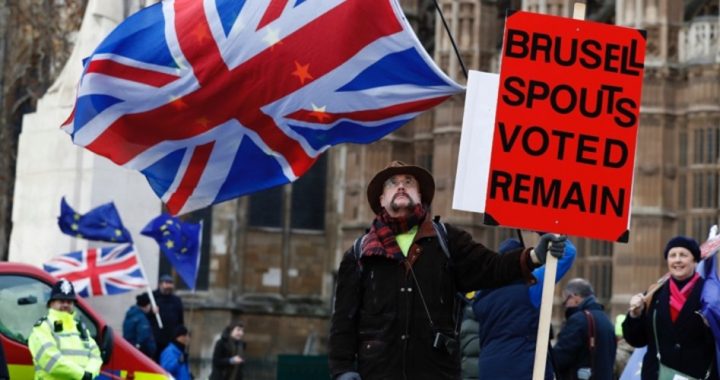
With Prime Minister Theresa May fighting desperately to somehow save her “soft” Brexit deal with the European Union, the British Parliament keeps putting roadblocks in the way of any Brexit — particularly a “no-deal” Brexit, which many claim would lead the U.K. into economic chaos.
On Tuesday, Parliament voted 303-296 in favor of a measure which states that the government needs explicit permission from Parliament to leave the European Union in the event that no deal is reached. The measure would not stop a March 29 Brexit, but limit certain taxation powers that the government enjoys without the expressed permission of the Parliament.
Twenty members of May’s own Conservative (Tory) Party crossed lines to vote for the measure. Three members of the Labour Party voted against it.
Opposition leader Jeremy Corbyn of the Labour Party, who introduced the measure, said, “This vote is an important step to prevent a no-deal Brexit. It shows that there is no majority in Parliament, the Cabinet or the country for crashing out of the EU without an agreement.”
May’s government downplayed the victory. A spokesman said, “This amendment does not change the fact that the UK is leaving the EU on March 29, and it will not stop the government from collecting tax.”
The amendment was added to financing legislation of last year. It basically states that the government’s power to amend tax laws in the wake of Brexit could only be used if a deal was reached, Brexit was cancelled, or if Parliament approved of a no-deal scenario.
The fears that are being stoked about the possibility of a no-deal Brexit — disruptions of shipping leading to shortages of medication and food — are apparently working, as Parliament seems intent on preventing a no-deal scenario.
Opposition MP Yvette Cooper said of the vote, “It is a warning to the Government not to drift into No Deal at the end of March by accident or through brinksmanship.”
“Whilst this amendment only applies to the Finance Bill, and whilst there are still a wide range of different views on the best way forward, it shows that enough MPs are ready to come together in a sensible way to oppose a chaotic No Deal.”
And if that wasn’t enough of a roadblock, Parliament voted today to make things even more difficult for May in the likely case that her deal does not pass when it is voted on next Tuesday. By a 308-297 count, MPs voted in favor of an amendment that gives the Prime Minister just three days to come up with a Plan B should her deal not pass in the House of Commons.
Under the previous legislation, May would have had three full weeks to come up an alternate exit plan. Critics believed that three weeks would give May too much time and allow her to, in effect, run down the clock to an inevitable no-deal Brexit.
The legislation was penned by Dominic Grieves, a Conservative MP and former attorney general. Grieves is among those MPs calling for a “do over,” or a new Brexit Referendum with new questions to replace the original 2016 vote.
“This [the vote] shows the urgency and determination of the Commons,” Grieves said.
What it truly shows is that Grieves and other Brexit opponents will stop at nothing to prevent any sort of Brexit — deal or no-deal — from happening at all.
A no-deal Brexit is the current fallback position should May’s “soft” Brexit, which envisions close trading ties between the U.K. and the EU, ultimately fail. Many Brexit supporters feel that a no-deal Brexit is the only way for the U.K. to leave the EU with its sovereignty fully intact. They also feel that the predictions of anarchy in the event of a no-deal Brexit are vastly overblown.
But others, apparently a slim majority in the House of Commons, believe that a deal must be in place in order to ensure an orderly withdrawal from the EU.
Even if May’s deal somehow passes next week, dozens of pieces of legislation will need to be passed before Great Britain leaves the globalist nightmare that is the EU. You can expect pitched battles in Parliament over every single one of those bills as long as “remainers” and globalists believe there’s a chance of derailing the will of Great Britain’s people, which was expressed by popular vote in 2016.
But May’s deal is “soft,” and it does tie the U.K. too closely with the EU. “No Deal” is the best way to go for Great Britain. Hopefully, the Boris Johnsons and Nigel Farages of Great Britain can somehow convince the people of that.
Photo: AP Images




